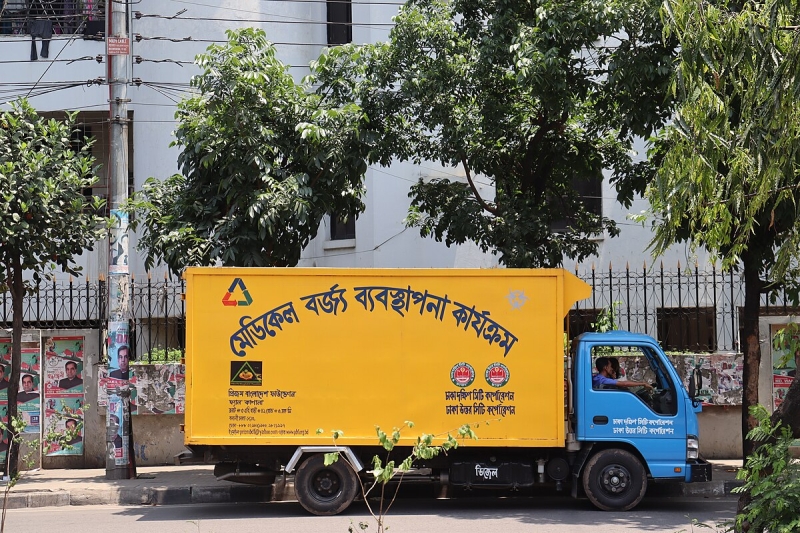- Advance Eid train ticket sale begins |
- Dhaka’s air quality world’s worst Tuesday with an AQI of 240 |
- Heads of Sonali Bank, IDRA, and SBC resign citing personal reasons |
- Fakhrul calls attack on Iran 'horrible' |
UNOPS, Takeda partner to tackle Bangladesh's medical waste crisis

Medical Waste management vehicle at Gulshan, Dhaka. Wikimedia Commons
Dhaka, Oct 1 - The United Nations Office for Project Services (UNOPS), in partnership with Takeda Pharmaceutical Company Limited (Takeda) has launched a transformative healthcare waste management initiative in Bangladesh.
The project aims to protect over 7.3 million people from infection risks linked to healthcare waste while boosting climate resilience in the public health system, said UNOPS said on Wednesday.
Supported by USD 7.1 million (JPY ¥1,023,546,180) from Takeda, it will establish a sustainable and replicable framework for medical waste management in underserved and climate-exposed regions.
In Bangladesh’s rural and disaster-prone districts, mismanaged medical waste poses an increasing threat to both public health and the environment.
Hospitals now generate around 3.4 kg of waste per bed per day, up from 2 kg in 2019, with this surge far outpacing the development of supporting infrastructure.
Over 80% of municipalities still lack proper waste treatment facilities.
Seasonal floods and cyclones worsen the situation, spreading untreated, infectious waste into nearby communities and water systems, and heightening the risk of diseases such as HIV, hepatitis and bacterial infections.
To address this urgent challenge, the project will establish six modern, climate-resilient medical waste treatment facilities, serving thousands each day and reaching over 1.8 million people annually.
It will also train 1,400 healthcare professionals and waste workers while engaging 250 community elders and volunteers to promote safe handling and disposal practices.
By emphasising behavioural change and local capacity building, the initiative seeks to ensure long-term impact.
“Our partnership with Takeda is a powerful example of what we can achieve when we join forces to tackle complex challenges. Together, we’re helping build safer, more climate- resilient healthcare systems in Bangladesh addressing medical waste head-on while strengthening local capacity," said Sanjay Mathur, UNOPS Regional Director for Asia and the Pacific.
Sanjay said they are proud to continue their collaboration with Takeda across the region, showing how private sector partnerships can drive real, lasting impact in public health.
“This collaboration demonstrates our shared commitment to strengthening health systems for Bangladesh's most vulnerable populations," said Toshie Ando, Head of Global CSR & Partnership Strategy, Global Corporate Affairs, Takeda.
"By addressing medical waste management in climate-affected communities, we will advance the development of sustainable solutions that safeguard public health and enhance local capacity. Together with UNOPS, we aim to create a model that can be adapted to serve similar communities facing these pressing challenges worldwide," Ando said.
Designed for scale and sustainability, the project integrates modern infrastructure, workforce training, recycling solutions, and close collaboration with local governments.
This evidence based model offers a blueprint for managing medical waste in other low resource, high risk settings worldwide linking infection control with climate resilience and stronger local governance. - UNB

